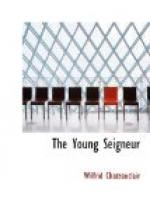Chamilly went with Chrysler to it on the first morning of his stay in Dormilliere, which was a Sunday. As they approached it through the square, filled with the tied teams of the congregation, a beadle, gorgeous in livery of black and red, with knee-breeches and cocked hat, emerged from the side door and proceeded to drive the groups of stragglers gently inwards with his staff, as a shepherd guides a flock.
Haviland looked at his friend, smiling.
“You are not in Ontario,” he said.
“Clearly not,” replied Chrsyler, “In my democratic Province, such a proceeding would be impossible.”
When they entered, the gorgeous beadle led them soberly up one of the aisles,—carrying his staff in a stately manner—to the seigneurial pew, a large, high enclosure, with a railing about the top like a miniature balustrade, and a coat-of-arms painted on the door; and into this he ushered them with grave form, and the Ontarian vividly began to realize that he was in a feudal land: after which he took a glance about him.
Filling the great phalanx of soiled and common pews in the nave, were the first representative mass of French-Canadians whom he had been brought to face. “Here,” he thought, “are those who speak the partner voice in our Confederation, and whom we should know as brothers.”
A few stood out in the quality of parts of the whole, but only to emphasize it as a mass. Above the crowd, he marked, for instance, the sober, responsible faces of the Marguilliers. A girl’s face too, particularly attracted him—that of one who sat beside the Sisters attendant over the convent children in their gallery. No romantic seraphieness glowed upon her features or her form; but she was following the service with the light of simply such spiritual earnestness and intelligence about her that she seemed to sit there a superior being. But it was the faces of the laborer and the solid farmer that oftenest dotted the surface of the sea of heads. So typical to him were the features and responses of all, that he could not shake off the feeling that it was not individuals he saw, but a People.
A People! No flippant thing is it to feel oneself in the presence of so great an Organism. If some hour of one man’s pain, or of the grandeur of some other one, may be thought-worthy things, how reverently must breath be hushed as we stand in presence of a race’s life, and think we hear its sorrows, cries and voices! Ever, thou People’s Song, must thou stir the heart that listens, sweeping its tenderest chords of pity, and chanting organ music to its aspirations.
The cure’s sermon following as before detailed, the congregation appeared oppressed with its denunciation, but it produced, no effect whatever upon Haviland, the Liberal leader, whose countenance rested its dark eyes on the tablets of his ancestors in the transept wall before him.




